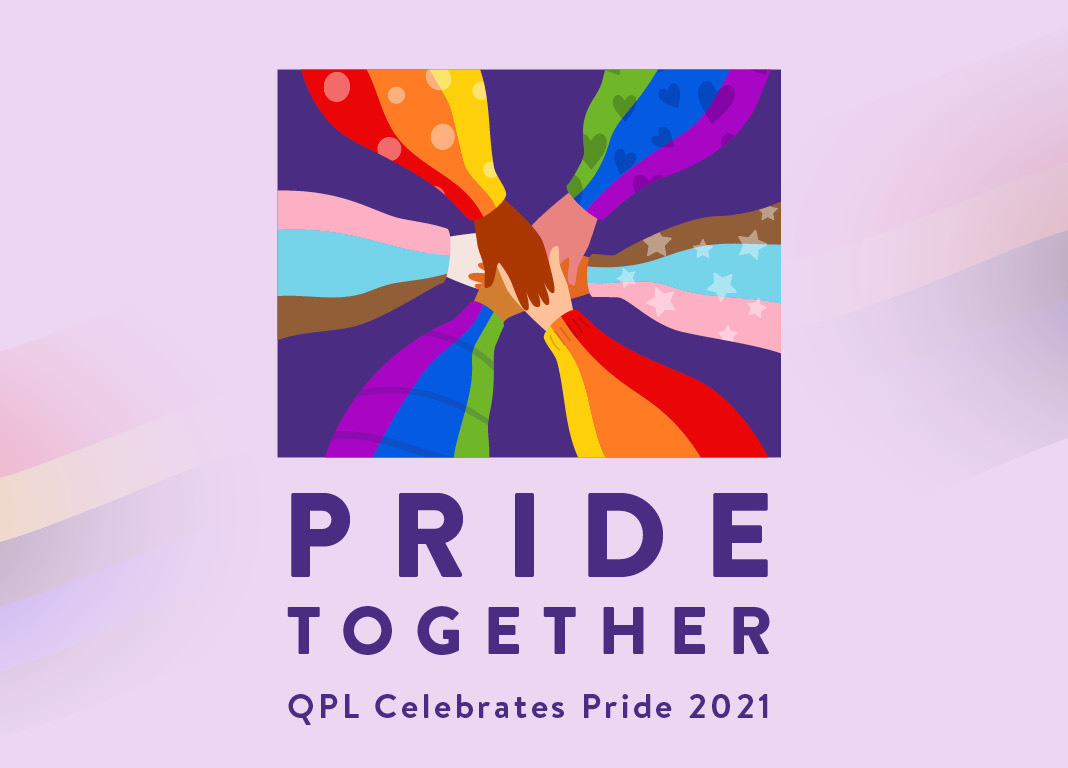This Pride Month, Queens Memory presented a program on LGBTQ+ Voices in Libraries. At the LGBTQ+ Voices in Libraries panel, moderated by Marissa Richardson, the assistant manager at Auburndale Library and chair of the LGBTQ + Allies Committee at QPL, LGBTQ librarians and an ally talked about their experiences showing LGBTQ customers they are welcome in the library.
Crescent Isaac-Muhammad, an ally who is a customer service specialist at Long Island City Library, shared how becoming an ally has changed the perspective of those around her, including her own family members, and made them more comfortable to talk to her and more accepting of others. Muhammad explained that it is intimidating not to be included and that once they showed the library was a LGBTQ supporter with book displays, customers felt more comfortable.
Asher MacInnis-Call, a non-binary librarian who is the assistant manager at Kew Gardens Hills, talked about using signals to show you’re a safe person or place. They described these signals as breadcrumbs, such as clothing or buttons showing LGBTQ symbols such as the trans flag. MacInnis-Call also talked about the importance of assuring intersectionality by being intentional and not just showing white cis LBBTQ authors, but including neurodiverse, disabled, and ethnically and racially diverse perspectives. “Ask colleagues what’s missing,” they encouraged their peers. They spoke about the overwhelming interest at Queens Public Library in the LGBTQ committee when it started, an interest that was so large that the committee’s first meeting had to be moved to another room to fit all those present.
Policies are just as important as the attitude that you project. Training about why policies are important can be crucial to help people understand why such policies matter. MacInnis-Call discussed situations when someone’s ID may not match their presentation, and the importance of using the name that they gave. Thomas Maxheimer, the manager of Ridgewood Library, speaking from the house of a relative who had previously not welcomed him in many years because he is gay, shared that the LGBTQ committee is working to achieve a written policy to use a person’s preferred name on their library card; many librarians do this already to be inclusive and welcoming. One written policy the committee has already successfully changed was to remove the Mr./Ms. designation from the library card application.
Muhammad spoke about the value of the library’s implicit bias training and that it could help prevent people from having unhelpful reactions to customers. MacInnis-Call emphasized that we can’t make the public safe for everyone, but we can make ourselves safe people for others. It only takes one person to make you comfortable, Muhammad said, sharing an experience she had with a transgender customer after making a Pride book display. The more diverse experiences you are exposed to, the more you see that experiences are not universal, MacInnis-Call said. Maxheimer shared that kids come out to him in the library, knowing from the symbols on his ID that he is a safe person.
The panel encouraged others to start LGBTQ committees to share resiliency, ideas, and camaraderie as well as to make change.
For LGBTQ resources and booklists, visit queenslib.org/pride2021.
Watch the panel here.

